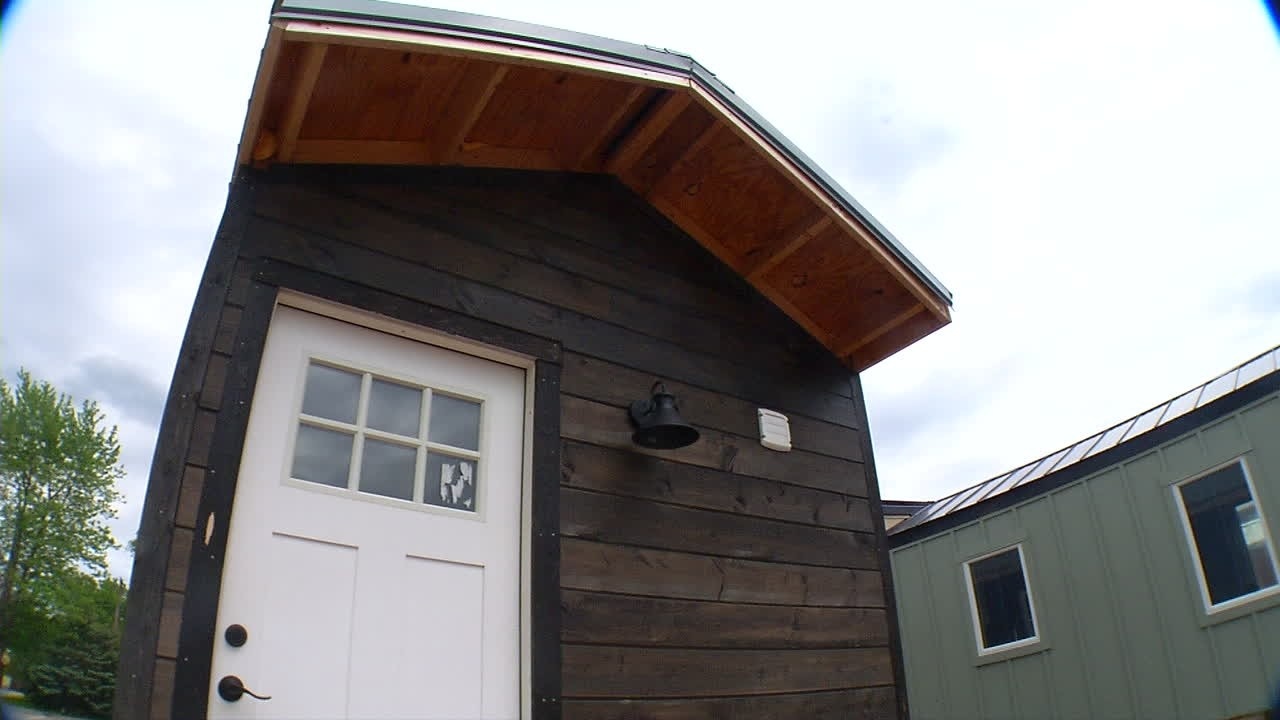‘It would be a new model of care.’ Nonprofit hoping to place some tiny homes in St. Paul
[anvplayer video=”5114091″ station=”998122″]
Tiny homes: for the homeless advocacy group ‘Settled,’ they are more than a shelter.
They’re a new way of living.
“Every faith community or individual community can rally around one of these tiny homes,” said Settled co-founder Anne Franz. “And lift one person out of homelessness.”
“It would be a new model of care,” added Gabrielle Clowdus, also a co-founder. “We would look at people with compassion and empathy and say we’ve got a lot to offer.”
For three years now, the nonprofit has been planning and building.

A tiny home sits in a staging area Tuesday, June 7, 2022, in the parking lot of Woodland Hills Church in Maplewood. (KSTP)
Each tiny home — sponsored by a different church in the area — costs around $35,000.
Volunteers built the small structures, about the size of a fish house, including the carpentry and the wiring.
There are now six completed homes — each about 100 square feet — to be placed in what’s called a sacred settlement.
“A sacred settlement is a community,” Franz explained. “An intentional community of tiny homes on religious land that is surrounded by a common house where people share amenities and live life together.”
If the St. Paul City Council approves a plan proposed by Settled, organizers say they’ll be able to move the homes-for-one to a new address on Wheelock Parkway.
Jeff O’Rourke, the pastor at Mosaic Christian Community, where the tiny homes will be located, said the church and Settled worked hard to ease neighborhood concerns.
He added there’s a sense of trust in the plan.
“What’s it going to look like? Is it going to be safe? Can my kids still play here?,” O’Rourke recalled residents asking. “It’s not tents, no it’s not going to be tents. It’s not RVs, is it? No, it’s not RVs. Is there going to be piles of stuff? No, there’s not going to be piles of stuff everywhere.”
Settled says these will be permanent homes.
Missionaries will live in two of them, and four of the homes will be occupied by people who’ve experienced long-term homelessness.
“We’re creating permanent homes for people, and when something is yours, you begin to grow roots,” Clowdus noted. “You become invested in the community and relationships and neighbors, and that makes all the difference.”
Settled says there’s also a vetting process. Those formerly experiencing homelessness will pay between $200 to $300 in monthly rent, and the group will find or assign them to tasks they will be paid to complete. In addition, the downstairs of the church has been converted into a communal space that includes a dining hall, bathrooms, showers, and laundry.
“It’s really designed for people to have routine interactions,” Franz told 5 EYEWITNESS NEWS. “So that really helps that intentional community who are interdependent on each other and are known and loved.”
Clowdus says the homes are built to last generations and make financial sense.
“People might say $35,000 is more than a shed in your backyard,” she declares. “But when you compare it to a new studio unit for affordable housing, it is a fraction of the cost of new affordable housing that we’re building. New affordable housing is about a quarter-million dollars for a studio unit apartment. This is a fraction of the cost.”
The two women say the idea behind these Minnesota tiny homes is modeled on other projects, like those in Boston and Austin, Texas.
Settled says there are now 500 tiny homes built on a 50-acre lot in Austin.
“We really wanted to have a distributed model, where you can have small clusters of an intentional community, sort of across the nation, to address our serious lack of affordable housing, and also our rising chronic homeless population,” Clowdus said.
If the city council gives the go-ahead, Settled hopes to have the homes in place and people living in them by sometime this summer.
The group is hoping others in the faith community or individuals will get together to build more tiny homes in Minnesota.
Not just homes — but also a community.
“It allows us not just to shelter but also provide that holistic response,” O’Rourke said. “Not just with a roof over their head but a relationship, a friendship, a partnership, a camaraderie, and a community to grow and do life together.”